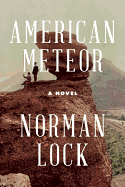
Veteran writer Norman Lock (The Boy in His Winter; Love Among the Particles) follows the life of the directionless Stephen Moran, from his role as a 16-year-old bugler for the Union Army during the Civil War to footman on the Transcontinental Railroad and official George Custer photographer during the Battle of Little Bighorn. In the early 20th century, Moran colors his first-person narrative with anachronistic anecdotes of a future that comes to him in the dreams Chief Crazy Horse bestowed upon him like a curse.
What's most striking about American Meteor is how swiftly, efficiently and sometimes callously it distills the United States's history of violence into one or two lyrical sentences. After surviving the Civil War, Lock's jaded narrator spends a season among the Ute Indians of Utah and says, "The Indians believed they inhabited an endless ribbon of time. Ten thousand years on the Great Plains had done nothing to disabuse them. It took us whites just twenty-five years to show them they were wrong."
This is what Moran is most fascinated by: What are humans capable of doing to one another in the pursuit of destiny? In this story, populated both by historical figures and metaphysical entities, the country's destiny is equal parts unspeakable evil and transcendent love.
In this way, the novel moves beyond historical fiction. While Abraham Lincoln, Ulysses S. Grant and Walt Whitman all make appearances in it, American Meteor is, at its core, a spiritual treatise that forces its readers to examine their own role in history's unceasing march forward. --Josh Potter

